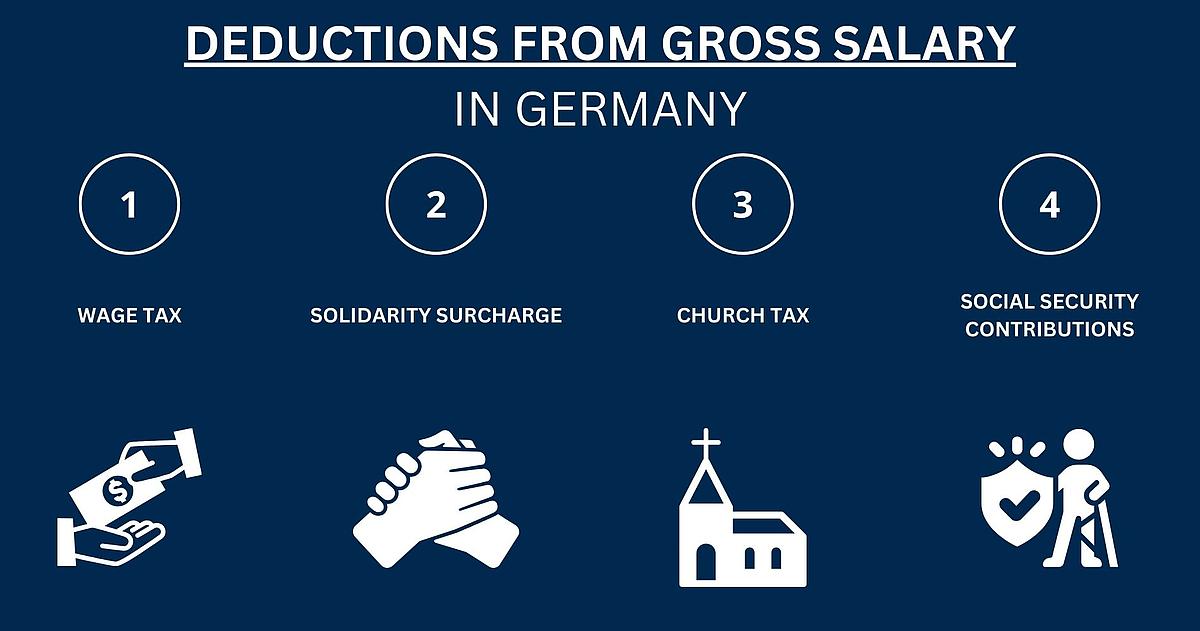This Website uses cookies to improve your visit on our website. More Info
Salary Check: Top Earner straight out of University?
A salary check is an essential tool to ensure that you are being paid fairly and appropriately for your work. In an ever-changing world of work, it is crucial to regularly review your salary and compare it to industry standards and personal qualifications. A salary check can not only help to identify unfair pay, but also serve as a basis for successful salary negotiations.
What is a good salary?
A good salary is relative and depends on several factors, including industry, work experience, geographic location, individual qualifications and standard of living. Here are some criteria that can define a good salary:
- Industry comparison: A good salary is in the top third of salaries for comparable positions in the same industry. Different industries have different salary levels, so it is important to benchmark against industry standards.
- Professional experience and qualifications: A good salary reflects one's professional experience, qualifications and acquired skills. The more experience and specialized knowledge you have, the higher your salary should be.
- Geographical location: The cost of living varies greatly depending on the region. A good salary in a big city like Munich or Frankfurt am Main must be higher than in a rural region to provide the same standard of living.
- Standard of living and personal needs: A good salary should allow you to cover your basic living expenses, build up reserves and afford a certain standard of living, including leisure activities and savings for the future.
- Market value and demand : Occupations that are in high demand and where there is a shortage of skilled workers often offer higher salaries. A good salary reflects your market value in your specific occupational group.
- Comparison with colleagues: A good salary is also competitive compared to what your colleagues in similar positions in the same company earn. Transparency within the company can help to ensure fair salaries.
Ultimately, a good salary is subjective and should take into account your individual needs and career goals. It is advisable to carry out regular salary comparisons and, if necessary, conduct salary negotiations with well-founded information.
Salary Table Professions: Which professions and sectors earn the most and least?
Here is a rough overview of some professions and industries in Germany that typically have higher and lower salaries. Please note in the salary check that these figures are only rough averages and can vary greatly. The exact salary depends on many factors, including qualifications, experience, company size, region and industry.
| Range | Occupation/Sector | Average Gross Salary per Year (in Euro) |
|---|---|---|
| Highest earning professions | Doctor | 90,000 - 150,000+ |
| Management consultant | 70,000 - 120,000+ | |
| IT manager | 65,000 - 110,000+ | |
| Engineer | 60,000 - 100,000+ | |
| Pharmacist | 55,000 - 90,000+ | |
| Highest earning sectors | Banking and financial services | 70,000 - 120,000+ |
| Management consultancy | 65,000 - 110,000+ | |
| IT and telecommunications | 60,000 - 100,000+ | |
| Pharmaceutical industry | 55,000 - 90,000+ | |
| Automotive industry | 50,000 - 85,000+ | |
| Low-paid occupations | Warehouse worker | 20,000 - 30,000 |
| Retail sales assistant | 20,000 - 30,000 | |
| Cleaning worker | 18,000 - 25,000 | |
| Nursing assistant | 22,000 - 32,000 | |
| Waiter/waitress | 20,000 - 28,000 | |
| Low-paying sectors | Gastronomy | 20,000 - 30,000 |
| Retail | 20,000 - 30,000 | |
| Agriculture | 22,000 - 35,000 | |
| Education | 25,000 - 40,000 | |
| Social and health services | 22,000 - 35,000 |
Average Salary Check: In the salary check, pay attention to whether the data deals with average salary or median salary
The median salary is often more accurate than the average salary in the salary check when it comes to representing the typical remuneration in a company or a particular group of employees.

While the average salary simply divides the total amount of salaries by the number of people, the median salary takes into account the median salary range: half of the employees earn more and the other half earn less than this value.
The median salary is therefore less prone to upward or downward outliers that can distort the average salary, especially in countries with large income disparities such as Germany. It provides a more accurate idea of what is typical or representative pay for work in a particular industry or region.
When we talk about it, median salary is often a better indicator of median income levels and can be more useful in understanding the reality of income distribution in Germany.
Salary check: Gross vs. Net - How much remains?
In principle, the gross salary is the amount that an employee earns before deduction of taxes and social security contributions. The net salary is the amount that ends up in the bank account after all taxes and social security contributions have been deducted.
Overview: Deductions from gross salary in Germany
There are various deductions from gross salary in Germany. An overview of the four known deductions from gross salary is shown in the following diagram.

Explanation: Deductions from gross salary in Germany
The exact amount that is deducted from gross salary depends on the level of salary and other individual circumstances, which can be found out through a salary check. A rough rule of thumb is that around 30-40% of gross salary can be eaten up by these deductions. However, this varies greatly depending on your individual situation. These deductions are prescribed by law and serve the common good and social security of the population in Germany.
Payroll Tax
Payroll tax is a direct tax on income paid by employees on their earnings. It finances public services such as education, infrastructure and social safety nets. It is calculated on the basis of annual income and deducted monthly from gross salary.
Church Tax
Church tax is a voluntary tax that is only paid by members of certain religious communities. It supports the financing of the respective church or religious community.
Solidarity Surcharge
The solidarity surcharge was introduced to cover the costs of German reunification. It is an additional levy to income tax and is used to support federal government tasks. This surcharge on income tax, which has been abolished or greatly reduced for many taxpayers since 2021.
Social Insurance Contributions
Social insurance contributions finance statutory social insurance schemes such as health, pension, unemployment and long-term care insurance. They serve to protect and safeguard employees and their families in various life situations.
salary check germany
The salary situation in Germany is a multifaceted topic that sheds light on the diversity of income levels and differences in the country. From occupations and industries to regional differences and individual factors such as education and experience, the salary situation reflects both economic realities and societal challenges. An in-depth look at this salary structure makes it easier to carry out a complete salary check.
The minimum wage - What's it all about?
The minimum wage is set by law and defines the lowest amount that employers must pay their employees per hour. In Germany, the general statutory minimum wage was introduced on January 1, 2015 and has been regularly adjusted since then according to certain criteria, in which a paycheck can also play a role. It is intended to ensure that employees receive appropriate pay that at least covers their living costs.

Some important points about the minimum wage in Germany are:
- Amount: The minimum wage is set by an independent commission and amounts to 12.41 euros per hour in 2024. However, this amount may change, as the Minimum Wage Commission regularly reviews whether and at what level the minimum wage should be adjusted.
- Scope of application: The statutory minimum wage applies in principle to all employees in Germany, regardless of the sector or employment contract (e.g. full-time, part-time, mini-job). Exceptions only apply to certain groups such as trainees, the long-term unemployed in the first six months of employment or young people who have not completed vocational training.
- Enforcement: Employers are obliged to pay the minimum wage. Violations can have legal consequences, including back payments to the employees concerned.
- Effects: The minimum wage is intended not only to improve the income situation of low earners, but also to reduce social inequalities and stabilize the general economy by increasing the purchasing power of the population.
Overall, the statutory minimum wage is an important component of labor market policy in Germany, which aims to promote fair working conditions and ensure basic protection for employees. It can therefore be regarded as the lowest limit in the pay check.
How big are the salary differences in Germany?
The salary check shows that salary differences in Germany can be quite significant and depend on various factors such as profession, industry, region, education, experience and negotiation skills. In large cities such as Munich, Frankfurt or Hamburg, salaries are often higher due to the higher cost of living and the concentration of companies in these regions.
Occupations in IT, engineering, finance and management tend to offer higher salaries compared to industries such as education, arts or social services. There are also often salary differences between eastern and Western Germany and between rural and urban regions.
Experience and further training also play an important role. People with specialized knowledge or management experience often earn more than their colleagues with less experience or without corresponding further training.
It is therefore advisable to be well-informed about the salary structures in the respective industry and region and, if necessary, to regularly review and negotiate your own salary in order to be paid appropriately.

Relevant factors for the
salary comparison

Salary comparison in the salary check
| Factor | Explanation |
|---|---|
| Occupation/Position | The specific role or position a person holds within a company or industry. |
| Industry | The industry in which the person is employed (e.g. IT, healthcare, financial services). |
| Qualifications | Educational qualifications, certificates, specialized training or work experience relevant to the position. |
| Work experience | The number of years or duration of practical work in a specific position or industry. |
| Region | The geographic location, which may affect salary levels due to differences in the cost of living and demand for certain skills. |
| Company size | The number of employees in a company, as larger companies can often offer higher salaries and other benefits. |
| Negotiation skills | The ability to maximize salary and other benefits when hiring or in salary negotiations. |
| Work schedule | Full-time, part-time or freelance, which can affect salary and additional benefits such as vacation. |
| Additional compensation | Bonuses, commissions, stock options or other monetary benefits that may be paid in addition to base salary. |
| Seniority | The length of time a person has worked at a company, which is often associated with increasing salary and additional benefits. |
| Working conditions | Factors such as flexibility, work environment, working hours and other non-monetary benefits that influence the overall offer of a job. |
This table shows relevant factors that should be considered when comparing salaries as part of a salary check, along with brief explanations. These factors are crucial in determining a person's actual salary level and can vary greatly depending on individual circumstances.
Salary check factor: Salary according to educational background
Education plays a decisive role in income development and career progression in Germany.
Gross salary in Germany by educational background
Here is a table showing the average gross salary in Germany by educational background:
| Educational background | Average gross salary per year (in euros) |
|---|---|
| Without school-leaving certificate | 20,000 - 30,000 |
| Secondary school certificate | 22,000 - 35,000 |
| Realschul certificate | 25,000 - 40,000 |
| Abitur / Fachabitur | 30,000 - 50,000 |
| Bachelor's degree | 35,000 - 60,000 |
| Master's degree | 40,000 - 70,000 |
| Doctorate | 50,000 - 90,000+ |
Explanation: Salaries according to educational background
- Without school-leaving certificate: People without a formal school-leaving qualification generally earn less due to limited professional opportunities and qualifications.
- Secondary school certificate: With a secondary school certificate, jobs can be found in simple activities, but the salary is often lower.
- Realschul certificate: The Realschul certificate gives access to intermediate qualification levels, which can lead to slightly higher salaries.
- Abitur / Fachabitur : The Abitur or Fachabitur opens up access to apprenticeships and universities of applied sciences, which can lead to higher starting salaries.
- Bachelor's degree : A Bachelor's degree qualifies you for many professions and leads to higher salaries compared to lower educational qualifications.
- Master's degree: A Master's degree often increases specialization and earning potential through access to higher positions and specialized industries.
- Doctorate: A doctorate (PhD) is often associated with academic or research careers and can lead to the highest salary ranges.
Salary check factor: Salary according to responsibility
Managers generally earn more than specialists due to the additional responsibility and strategic importance of their position.
Gross salary in Germany by area of responsibility
Here is a table showing the average gross salary in Germany by area of responsibility:
| Area of responsibility | Average gross salary per year (in euros) |
|---|---|
| Specialist | 35,000 - 60,000 |
| Team leader | 45,000 - 75,000 |
| Head of department | 55,000 - 90,000 |
| Division manager | 70,000 - 120,000+ |
| Managing Director | 100,000 - 200,000+ |
Explanation: Salaries by area of responsibility
- Specialist: Specialists have specialized knowledge in a specific field and usually earn average salaries, which can vary depending on the industry and experience.
- Team leader: Team leaders have initial management tasks and are responsible for a smaller team, resulting in a higher salary compared to pure specialists.
- Head of department: Heads of department have broader areas of responsibility and contribute to the strategic direction of the department, which is reflected in higher salaries.
- Division manager: Division managers take responsibility for larger business areas or functional areas and often have an influence on the company's overall strategy.
- Managing Director: Managing directors bear the highest level of responsibility in a company and often also have a share in the company's success, which can lead to the highest salary ranges.
Salary check factor: Salary according to professional experience
Professional experience is a decisive factor in salary development and can make a significant difference to earnings.
Gross salary in Germany by professional experience
Here is a table showing the average gross salary in Germany by professional experience:
| Work experience | Average gross salary per year (in euros) |
|---|---|
| Less than 2 years | 30,000 - 40,000 |
| 2 - 5 years | 35,000 - 50,000 |
| 5 - 10 years | 40,000 - 60,000 |
| 10 - 15 years | 50,000 - 70,000 |
| Over 15 years | 60,000 - 90,000+ |
Explanation: Salaries according to professional experience
- Less than 2 years: Entry-level employees generally earn lower salaries at the beginning of their career as they gain experience and develop their skills.
- 2 - 5 years : With 2 to 5 years of experience, salaries often increase significantly as expertise and practical skills are developed.
- 5 - 10 years : After 5 to 10 years of experience, professionals can be considered experienced in their respective fields and usually earn higher salaries.
- 10 - 15 years: With 10 to 15 years of experience, many professionals have already progressed through several career stages and can work in managerial or specialized positions, leading to further salary increases.
- Over 15 years: Professionals with over 15 years of experience often have extensive expertise and can work in leadership or highly specialized roles that justify higher salaries.
If you find out during your salary check that you could earn more, then hopefully our salary negotiation advice page will help you!
To the Salary Negotiation PageSalary check factor: Salary by place of residence or region
The choice of place of residence has a direct influence on salary levels due to regional economic conditions and the cost of living.
Gross salary in Germany by place of residence or region
Here is a table showing the average gross salary in Germany by place of residence or region (small town, large city or rural):
| Place of residence/region | Average gross salary per year (in euros) |
|---|---|
| Large city (e.g. Berlin, Munich, Hamburg) | 40,000 - 70,000+ |
| Medium-sized city (e.g. Stuttgart, Cologne, Leipzig) | 35,000 - 55,000 |
| Small town (e.g. rural districts, smaller towns) | 30,000 - 45,000 |
| Rural region | 25,000 - 40,000 |
Explanation: Salaries by place of residence or region
- Large city: Large cities such as Berlin, Munich or Hamburg often offer the highest salaries due to the higher cost of living and the concentration of industry and services.
- Medium-sized city: Medium-sized cities such as Stuttgart, Cologne or Leipzig offer salaries that may be slightly lower than in large cities, but still above the average of small towns and rural regions.
- Small town: Small towns and rural districts usually offer lower salaries compared to large cities, but often have a lower cost of living and a higher quality of life.
- Rural region: Rural regions tend to have the lowest salaries, as there is less economic activity and fewer companies that can pay higher wages.
Salary check factor: Salary by company size
The size of the company often influences the salary structure and the type of working conditions and benefits offered.
Gross salary in Germany by company size
Here is a table showing the average gross salary in Germany by company size (start-up, medium-sized or large corporation):
| Company size | Average gross salary per year (in euros) |
|---|---|
| Start-up | 35,000 - 55,000 |
| Medium-sized company | 40,000 - 65,000 |
| Large corporation | 50,000 - 80,000+ |
Explanation: Salaries according to company size
- Start-up: Start-ups often offer exciting but also risky working environments. Salaries can be competitive, but often slightly lower than in established companies.
- Medium-sized company: Medium-sized companies are often more flexible and offer good development opportunities. Salaries can vary depending on the industry and the financial stability of the company.
- Large corporation: Large corporations usually have the resources to offer competitive salaries. They also often offer additional benefits and development opportunities within the company.
Salary check factor: Salary by gender
The discussion about income inequality between the sexes is complex and is often influenced by socio-cultural and structural factors that go beyond purely professional factors.
Gross salary in Germany by gender
Here is a table showing the income comparison between women and men in Germany:
| Gender | Average gross salary per year (in euros) |
|---|---|
| Men | 45,000 - 65,000 |
| Women | 40,000 - 60,000 |
Explanation: Salaries by gender
- Men: On average, men earn slightly higher salaries than women in Germany. This can be explained by various factors such as career choice, industry preferences, negotiation skills and potential discrimination.
- Women: On average, women earn slightly less than men. This may be partly due to traditional role models, different career paths and part-time employment, which women choose more often.
Starting salaries after studying Business Studies
After completing a Business Studies degree in Germany, such as the International Business courses at Munich Business School, salary prospects can vary greatly depending on various factors such as work experience, specialization, company size and location. Typically, Business Studies alumni are offered versatile career opportunities in a variety of industries, from financial services and business consultants to marketing and human resources. Here are some general salary ranges and other aspects that are relevant:
Degree
- Bachelor's degree: For alumni with a Bachelor's degree in Business Studies, the average starting salary in Germany is between 35,000 and 45,000 euros gross per year.
- Master's degree: Alumni with a Master's degree in Business Studies can often expect higher starting salaries. The range here is generally between 40,000 and 55,000 euros gross per year.
Important Factors
It is important to note that these figures are averages and can be influenced by various factors, such as the following:
- Industry differences: salaries can vary greatly depending on the industry. Industries such as business consultants, financial services or technology often offer higher starting salaries than the public sector or non-profit organizations, for example.
- Regional differences: Salary levels can vary considerably depending on the region, particularly the economic strength and cost of living in cities such as Munich, Frankfurt or Hamburg compared to smaller towns or rural areas.
- Additional qualifications: In addition to a university degree, internships and additional qualifications such as language skills or specialized certificates can positively influence salary negotiations.
- Professional experience : Salaries increase with professional experience. Business Studies alumni can quickly advance to junior or assistant positions that allow them to expand their skills and network.
- Specialization: Specialized areas such as finance, marketing or corporate strategy can often offer higher salaries as they require specific expertise.
- Company size: Larger companies and corporations tend to offer higher salaries than smaller or mid-sized companies due to their financial resources and ability to offer diverse career paths.
Starting salaries after studying Business Studies at Munich Business School
According to the MBS Alumni Survey 2022/23, starting salaries after a Bachelor's, Master's or MBA study at MBS were in the following range:
| Study program | Salary range after MBS graduation |
|---|---|
| Bachelor | 32.000 € - 62.000 € |
| Master | 44.000 € - 77.000 € |
| MBA | 99.000 € - 115.000 € |
Business Studies alumni often have good opportunities to advance their careers quickly as they have in-depth knowledge in areas such as Management, Finance, Marketing and Corporate Management. Continuing education and specialization can help them to further increase their salary and advance to management positions.
Similar Study Guide Topics:
Salary Negotiations
Working alongside your Studies
Student Loan
Résumé/Curriculum Vitae (CV)
FAQ
You know you're earning enough when your salary covers your living costs, provides you with financial security and is competitive with industry standards and your colleagues.
You can convert gross to net by using an online calculator that takes taxes and social security contributions into account, or by using your payslip.
A salary check is a review of whether your salary is fair compared to industry standards, work experience and qualifications.
In the interview, you can ask for a salary that is customary in the industry and corresponds to your experience and qualifications.
You can ask for about 10-20% more salary, depending on your performance, market value and the salary structures in your company.
Interested in a study program? Request our information material now!
More exciting degree programs in Munich













